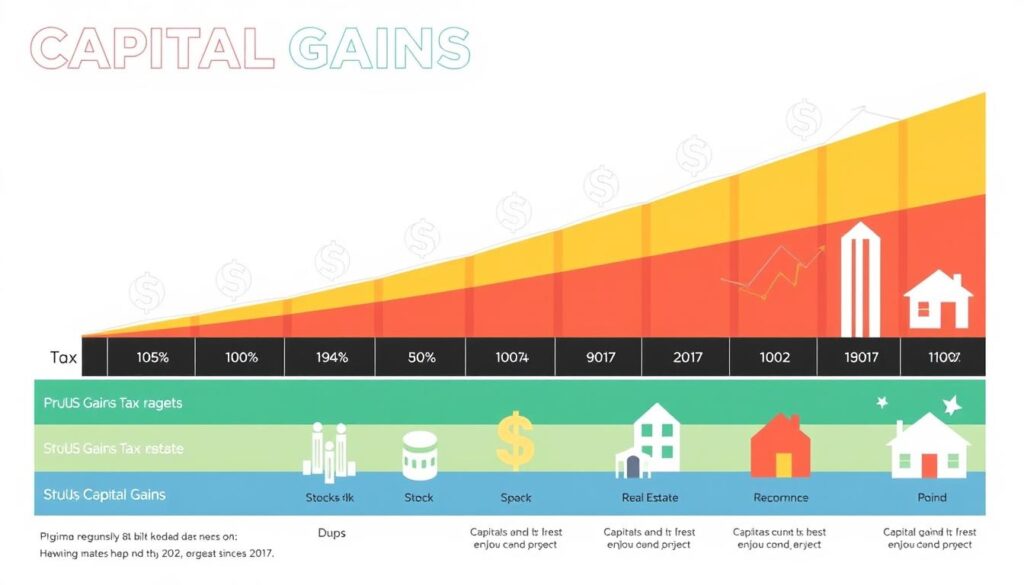Have you ever found yourself hesitant to make a significant investment, weighing the potential returns against the looming shadow of capital gains tax? It’s a feeling many experience—a blend of excitement and trepidation as you contemplate if the gains will be worth the tax implications. Understanding capital gains tax is crucial for effectively managing your investments and making informed decisions about your financial future. This article is here to guide you, offering clarity on the nuances of capital gains tax, its implications for your wealth, and practical tax strategies to navigate it confidently. Whether you’re exploring short-term opportunities or considering long-term wealth-building strategies, you’ll find valuable insights that empower you in your financial journey1.
Key Takeaways
- Capital gains tax can significantly impact your investment returns.
- Understanding the differences between short-term and long-term capital gains is crucial.
- Utilizing tax strategies appropriately can minimize your tax burden.
- Your income level affects the rate at which your gains are taxed.
- Stay informed about current tax rates to make better investment decisions.
What Is Capital Gains Tax?
Understanding the capital gains tax definition is essential for anyone who invests in assets such as stocks, bonds, or real estate. A capital gain occurs when you sell an asset for more than its original purchase price, which is often referred to as its basis. This tax applies only when gains are realized, meaning you profit from an actual sale2.
Definition and Overview
Capital gains taxes appear in two main categories: short-term capital gains and long-term capital gains. When you sell an asset held for one year or less, the profits are categorized as short-term and taxed at your ordinary income tax rate, which can be significantly higher than that for long-term gains. On the other hand, profits from assets held for over a year are considered long-term capital gains, enjoying lower tax rates that can range from 0% to 20% based on your income and filing status3.
Short-term vs. Long-term Capital Gains
Grasping the difference between these two categories is crucial for effective financial planning. Short-term capital gains can face taxes ranging from 10% to 37% depending on your tax bracket, while long-term capital gains present more favorable rates that encourage investing for growth over time3.
Why It Matters to You
Why should you care about capital gains taxes? They can impact your financial success by affecting your total investment profits and shaping your investment strategies. Understanding these tax implications can help you make informed decisions and maximize your returns.

How Capital Gains Tax Works
Understanding how capital gains tax operates is essential for optimizing your financial strategy. The capital gains tax calculation begins with determining the profit made from selling an asset, which is the difference between the selling price and the purchase price. For long-term capital gains, this tax rate ranges from 0% to 20% based on your taxable income and filing status, with long-term assets being those held for more than a year45. On the other hand, short-term capital gains, determined by ordinary income tax brackets, can vary from 10% to 37%, highlighting a significant difference in the tax rate depending on how and when you sell your assets5.
The Basics of Tax Calculation
To calculate your capital gains tax, start with the formula: Capital Gain = Selling Price – Purchase Price. This allows you to easily observe the profit before figuring out your applicable tax rate. For example, if you sell an investment for $10,000 that you bought for $6,000, your capital gain is $4,000. This amount due in taxes will depend on whether that gain is short-term or long-term.
Understanding Your Tax Rate
Your long-term capital gains tax can be dramatically lower than your short-term capital gains rate. Investors should aim to hold on to their assets for over a year to benefit from the favorable long-term tax rates. Don’t forget that the net investment income tax, a 3.8% additional charge, may apply if your modified adjusted gross income surpasses specific thresholds45.
The Role of Your Income Level
Your income level impact comes into play significantly within the capital gains tax framework. Higher income can push you into a different tax bracket, impacting how much you owe when realizing your gains. For instance, while the first $48,350 of capital gains for single filers may be taxed at 0%, earnings above this amount incur greater tax responsibilities45.

Key Terms You Should Know
Understanding the key terms associated with capital gains tax is essential for effectively managing your investments. Here are some crucial concepts to consider, which will help clarify the complexities surrounding capital assets and their tax implications.
Capital Assets Explained
Capital assets encompass a broad range of items that you might own. This typically includes stocks, bonds, real estate, and personal-use assets such as vehicles and art. Knowing which of your belongings qualify as capital assets is vital, as this classification determines how capital gains tax is applied when you sell or exchange these items6.
Exemptions and Deductions
One of the significant benefits of capital gains tax law is the availability of capital gains tax exemptions. For instance, when homeowners sell their primary residence, they might qualify for an exemption that allows them to exclude gains up to $250,000 for single filers and $500,000 for joint filers7. It’s essential to stay informed about these exemptions since they can dramatically affect your taxable income and overall tax liability.
Holding Period Clarifications
The holding period of your capital assets is a crucial factor in determining the applicable tax treatment. Assets held for longer than one year typically qualify for lower long-term capital gains tax rates, set at 0%, 15%, or 20%, based on your taxable income and filing status6. Understanding this distinction will help you formulate better strategies for asset disposal and tax planning.

Types of Capital Gains
Understanding the different types of capital gains is essential for effective financial planning and investment strategies. These gains can be broadly classified into real estate gains, investment gains, and gains from collectibles. Each type comes with its own tax implications and benefits, which can affect your overall financial health.
Real Estate Gains
Capital gains on real estate often have unique rules that can be beneficial. For example, you may qualify for an exclusion on the gain from the sale of your primary home if certain conditions are met. Knowing these specifics can make a significant difference in tax liability when selling property.
Investment Gains
Investment gains typically arise from the sale of assets such as stocks, bonds, and mutual funds. Realized gains from investments held for over a year are subject to preferential long-term capital gains rates, which can significantly lower your tax burden. Keeping accurate records of your investment transactions is crucial for calculating gains accurately and reporting them to the IRS. The tax rates can range from 0% to 20% based on income levels, and short-term gains, accrued on assets held for less than a year, are taxed at standard income tax rates89.
Collectibles and Other Assets
Gains from collectibles, such as art, coins, or antiques, face specific tax rules as well. For instance, these gains can be taxed at a fixed long-term rate of up to 28%, which is substantially higher than other capital gains9. This fact emphasizes the importance of considering collectibles tax as part of your broader investment strategy.

| Type of Gain | Tax Rate | Holding Period |
|---|---|---|
| Real Estate Gains | Exclusion possible under specific conditions | Variable |
| Investment Gains | 0% to 20% for long-term; Ordinary income rates for short-term | Over 1 year for long-term; 1 year or less for short-term |
| Collectibles Gains | Up to 28% long-term | Over 1 year |
Reporting Capital Gains
When it comes to reporting capital gains, understanding the necessary documentation and processes is crucial. Accurate reporting not only ensures compliance with tax laws but also helps you avoid potential penalties. Below are essential steps and common pitfalls that taxpayers should be mindful of during the reporting process.
Necessary Documentation
Maintaining appropriate documentation is the first step in effectively reporting capital gains. You should keep detailed records of purchase and sale transactions, which can support your reported gains. For instance, U.S. citizens selling property abroad must report these gains unless exempted by U.S. law10. Additional documentation includes:
- Purchase receipts
- Sales contracts
- Broker statements
- Form 1099-DIV for mutual fund distributions
Steps to File Your Gains
To file your capital gains, you typically report them using Schedule D of your tax return. This form covers both short-term and long-term gains, and provides a comprehensive overview of any losses incurred11. It’s essential to understand different forms required for specific transactions:
| Type of Asset | Form Required |
|---|---|
| General Capital Gains | Schedule D |
| Business Property | Form 4797 |
| Installment Sales | Form 6252 |
| Mutual Fund Distributions | Form 1099-DIV |
Common Filing Mistakes to Avoid
Avoiding filing mistakes is fundamental for accurate reporting capital gains. Common errors include:
- Failing to report all transactions
- Miscalculating gains due to incorrect adjustments on the basis of assets
- Overlooking deductions that might lower your tax liability

Tips for Minimizing Capital Gains Tax
Understanding various strategies for minimizing capital gains tax can greatly benefit your financial situation. By implementing effective planning techniques, you can significantly reduce your overall tax burden. Below are some essential tips for navigating capital gains tax effectively.
Tax Loss Harvesting Strategies
Tax loss harvesting is a valuable strategy that involves selling investments that have incurred losses to offset capital gains. This technique allows you to offset up to $3,000 of ordinary income per year, effectively lowering your taxable income12. Furthermore, if you strategically farm your losses in years with substantial gains, you can optimize the tax advantages available to you12.
Utilizing Retirement Accounts
Utilizing retirement accounts, such as 401(k)s and IRAs, provides a significant advantage when it comes to taxes. These tax-advantaged accounts allow your investments to grow without immediate taxation, deferring tax payments until you withdraw funds13. This approach is particularly effective for long-term investment growth, helping you maintain your wealth while minimizing capital gains tax.
Timing Your Sales Wisely
Timing your asset sales is crucial for minimizing capital gains tax. Holding your investments for longer than one year allows you to take advantage of lower long-term capital gains rates compared to short-term rates12. Being intentional about when to realize gains can lead to savings and better management of your overall tax liabilities.

Capital Gains Tax Rates Explained
Understanding capital gains tax rates is vital for anyone involved in investments or property transactions. This section will delve into the current federal tax rates, state-specific variations, and specialized rates that apply to certain assets.
Current Federal Tax Rates
The federal long-term capital gains tax rates for 2024 range from 0% to 20%, depending on your taxable income and filing status14. Those holding assets for over a year qualify for the lower long-term rates compared to short-term gains, which are taxed at regular federal tax rates ranging from 10% to 37%15. If you are a high-income earner, be aware that you might face an additional 3.8% tax under the Net Investment Income Tax (NIIT) if your modified adjusted gross income exceeds certain limits15.
State-Specific Variances
State variations can significantly alter your overall tax burden. Each state has its own tax structure that often applies atop federal taxes. Various states have different capital gains tax rates, which can vary widely, so it is crucial to research and understand your state’s tax laws thoroughly15.
Special Rates for Specific Assets
Certain assets come with unique capital gains tax rates. For instance, collectibles are typically taxed at a higher long-term rate of 28%15. Furthermore, cryptocurrency is classified as property by the IRS, subject to the same capital gains tax rates as other investments15. If you decide to donate appreciated assets to a qualified nonprofit, you may benefit from tax deductions and gain exemption from capital gains tax14.

| Tax Rate Category | Long-term Capital Gains Rate | Short-term Capital Gains Rate |
|---|---|---|
| Low Income | 0% | 10% – 12% |
| Middle Income | 15% | 22% – 24% |
| High Income | 20% + 3.8% NIIT | 32% – 37% |
| Collectibles Rate | 28% | N/A |
Common Exemptions and Loopholes
Understanding common exemptions and loopholes can significantly reduce your capital gains tax obligations. By leveraging specific strategies, you can navigate the complexities and potentially minimize your tax liabilities.
Primary Residence Exemption
The primary residence exemption allows homeowners to exclude up to $250,000 in capital gains from the sale of their principal residence, or up to $500,000 for married couples filing jointly. This benefit applies if you meet the ownership and use tests, including residing in the home for at least two of the past five years16. Utilizing the primary residence loophole can be an effective way to shield profits from taxation.
Like-Kind Exchanges
Like-kind exchanges allow investors to defer capital gains taxes by reinvesting the proceeds from a property sale into another similar property. This strategy can offer significant tax benefits and is particularly favored among real estate investors looking to preserve capital16. By adhering to the guidelines established under Section 1031 of the IRS code, you can effectively roll over gained profits without immediate tax penalties.
Small Business Stock Exclusion
The small business stock exclusion is an attractive option for investors in qualified small business stock (QSB). This exclusion can potentially allow you to exclude up to 100% of the gain from taxable income when the stock is held for more than five years, subject to other conditions17. Such provisions make this strategy appealing for those looking to invest in startups or small enterprises while minimizing future tax implications.

How to Prepare for Capital Gains Tax
Preparing for capital gains tax requires strategic planning and mindful tracking of your investments throughout the year. Keeping meticulous records helps you identify your taxable gains, making it easier to manage your tax obligations during filing season.
Keep Track of Your Investments
Regularly monitoring your investments allows you to understand their performance and potential tax implications. Utilizing apps or software that assist in tracking investments can streamline this process, ensuring accurate records are maintained.
Understand Your Tax Obligations
Familiarize yourself with the IRS guidelines to fully grasp your tax obligations. Changes in income and market activities influence the rates applicable to your capital gains, so staying informed is vital to effective tax preparation18.
Consider Professional Help
Engaging with a professional tax advisor can be highly beneficial. These experts provide tailored advice and planning strategies, ensuring that you navigate the complexities of capital gains tax effectively19. This level of professional tax help can ultimately lead to significant savings and optimized investment return strategies.

Capital Gains Tax and Investments
Understanding capital gains tax is essential for any investor. Your investments in stocks, real estate, and cryptocurrencies carry varying tax implications that can significantly influence your financial strategy.
Capital Gains in Stock Markets
When you sell stocks, the capital gains tax on stocks you incur can be categorized into short-term or long-term, depending on how long you held the asset. Short-term capital gains, applicable to assets held for one year or less, are taxed as ordinary income at rates ranging from 0% to 37%20. Long-term capital gains, for assets held longer than a year, generally incur lower rates. In 2023, the capital gains tax rate for most individuals is 15% for net capital gains, with rates scaling up based on taxable income21.
Impacts on Real Estate Investing
Capital gains tax and real estate investing present unique challenges and opportunities. Real estate sales profits can be tax-efficient if managed wisely, especially for primary residences, where exemptions may apply. Profits that roll into new properties can also alter tax liabilities. In this arena, long-term capital gains rates apply unless otherwise stated20. It’s essential to be aware that selling real property may incur a maximum tax rate of 25% on unrecaptured section 1250 gains21.
Cryptocurrency and Tax Considerations
Cryptocurrency tax remains a perplexing issue for many investors. Each transaction involving cryptocurrency is typically taxed upon realization of a gain. Therefore, understanding how capital gains tax applies is crucial when trading these digital assets. As with stocks, holding durations dictate whether you face short-term or long-term tax implications.

Consequences of Not Paying Capital Gains Tax
Being aware of the consequences of not paying capital gains tax is essential for maintaining your financial well-being. Ignoring these tax obligations can lead to various complications, including significant legal repercussions and financial penalties that can complicate your financial life.
Legal Repercussions
Failure to report capital gains can lead to serious legal issues with the IRS. You may face audits, which not only involve time and stress but also the potential for penalties and interest on unpaid taxes. Understanding the legal landscape surrounding capital gains tax is crucial, as the risk of legal trouble escalates with non-compliance.
Financial Penalties
Financial penalties for not complying with capital gains tax regulations can be significant. You could incur fines along with back taxes owed, adding layers of financial strain to your situation22. This accumulation of unpaid liabilities may lead to adverse consequences for your credit, making it challenging to secure loans or favorable rates in the future.
Impact on Future Investments
Moreover, ignoring capital gains tax obligations can hinder your ability to pursue future investment opportunities. Your financial standing could be adversely affected by prior tax issues, making lenders or partners wary of your investment potential23. Understanding this impact is vital for steering clear of pitfalls and maintaining a robust investment portfolio.

| Consequence | Description |
|---|---|
| Legal Issues | Audits, potential penalties, and interest from the IRS. |
| Financial Penalties | Possible fines, back taxes, and damage to credit standing. |
| Investment Opportunities | Challenges in securing financing and partnerships due to tax issues. |
Planning for Future Capital Gains
Strategic planning for future capital gains is essential for maximizing investment returns while minimizing tax obligations. Engaging in tax-efficient investment strategies can significantly enhance your financial outlook over time. By understanding the nuances of capital gains taxes, you can make informed decisions that benefit your portfolio.
Investment Strategies for Tax Efficiency
To optimize your investments, consider the impact of holding periods on tax rates. Short-term capital gains are taxed at ordinary income tax rates, with a top marginal rate of 37% under current U.S. tax law, while long-term gains enjoy lower tax rates that can peak at just 20%24. Embracing tax-loss harvesting techniques may also contribute to reducing your overall tax bill25. This strategy is particularly effective in high-turnover scenarios where investors frequently realize short-term gains.
Long-Term Financial Growth Mindset
Adopting a long-term financial growth mindset allows you to build wealth effectively, especially by holding investments longer than a year. Holding investments for extended periods qualifies you for the lower long-term capital gains tax rates, which can significantly enhance your profit margins24. Additionally, qualified Opportunity Zones (QOZs) can be an enticing option, offering potential deferment and reduction of capital gains taxes through investments in distressed communities.
Educating Yourself on Regulations
Staying informed about the evolving tax landscape is vital for effective capital gains planning. Regularly educating yourself on tax regulations will empower you to make timely financial decisions. Consultation with tax professionals or financial advisors is highly recommended to navigate complex investment options and strategies tailored to your unique financial goals25.

| Strategy | Benefits | Considerations |
|---|---|---|
| Long-Term Investing | Lower tax rates for gains | Need to withstand market fluctuations |
| Tax-Loss Harvesting | Reduces taxable income | Must comply with “wash sale” rules |
| Investing in QOZs | Potential tax deferment | Limited to designated areas |
Resources for Understanding Capital Gains Tax
Understanding capital gains tax is crucial for effective financial planning. You can access a variety of resources that provide insights into IRS guidelines, as well as recommended tax preparation software, which can assist in managing your tax responsibilities efficiently.
IRS Guidelines and Publications
The IRS offers a wealth of capital gains tax resources. Detailed publications outline specific guidelines and forms necessary for calculating and reporting your capital gains tax. Familiarizing yourself with these resources helps ensure compliance with tax regulations while maximizing your deductions.
Tax Preparation Software Recommendations
Selecting the right tax preparation software can significantly streamline your reporting tasks. Many software options automatically calculate capital gains taxes based on your entered data, ensuring accuracy and reducing the potential for errors. Maintaining records of your investments within these programs can further enhance your filing process, especially during tax season. Effective software choices include TurboTax, H&R Block, and TaxSlayer which are specifically designed to cater to various financial situations.
Professional Advisors and Tax Planners
Consulting with a professional tax advisor can provide personalized guidance tailored to your specific circumstances. Tax planners stay updated with current IRS guidelines and can offer strategies to optimize your tax situation. Employing their expertise often results in better tax planning effectiveness, ultimately benefiting your financial strategy.

| Resource Type | Examples | Benefits |
|---|---|---|
| IRS Guidelines | Publications, Forms | Compliance, Deduction Maximization |
| Tax Preparation Software | TurboTax, H&R Block | Efficiency, Accuracy |
| Professional Advisors | Certified Tax Planners | Personalized Strategies, Current Knowledge |
Incorporating these capital gains tax resources into your financial routine can ultimately simplify your overall tax experience262728.
Real-Life Examples of Capital Gains Tax
Understanding capital gains tax through real-life examples clarifies its implications on your investments and real estate transactions. You can learn valuable insights from capital gains tax case studies, which reveal how strategic management influences overall financial success. Below are some real-world scenarios that can provide clarity on this intricate topic.
Case Studies of Investors
Many investors have benefited from thorough capital gains tax case studies, showcasing diverse outcomes based on varying strategies. For instance, taxpayers with adjusted gross income (AGI) over $1 million reported an average of $1.6 million in capital gains, signifying a substantial portion of their overall income in 202129. By employing sophisticated tax planning, these investors could optimize their tax liabilities and enhance their returns.
Stories from Real Estate Transactions
Real estate tax stories often illustrate the nuances of exemptions and best practices. For instance, sellers of owner-occupied homes could exclude up to $250,000 in capital gains if single or $500,000 if married, provided certain residency criteria are met30. Such stories highlight the importance of awareness regarding capital gains tax regulations in navigating successful real estate transactions.
Insights from Experienced Tax Professionals
Tax professional insights reveal common pitfalls that many individuals encounter. For example, neglecting the step-up in basis principle can lead to significant capital gains tax burdens upon selling inherited property. Professionals suggest that understanding this concept can discourage clients from realizing gains until the time of death, ultimately aiding in tax liability management30.
| Factors | AGI Under $100K | AGI Over $1M |
|---|---|---|
| Average Capital Gains | $708 | $1.6 million |
| Percentage of Income | 2% | 42% |
| Tax Rate | — | 20% (Long-term) |
Conclusion: Mastering Your Capital Gains Tax
Gaining a comprehensive understanding of capital gains tax principles is critical for anyone seeking to invest wisely and manage their tax responsibilities. By mastering capital gains tax, you can optimize your investment choices and ensure compliance while benefiting from your assets. For instance, short-term capital gains are generally taxed at rates between 10% to 37%, similar to ordinary income, while long-term capital gains may see rates as low as 0%, 15%, or 20% depending on your income level, which can greatly influence your financial future3132.
Final Thoughts and Key Takeaways
Staying informed about changes in tax regulations and effective strategies can be a game changer in your investment journey. Utilizing tax-loss harvesting and tax-advantaged accounts are just a few methods that can help you manage your liabilities efficiently, allowing you to maximize your wealth. Remember that the IRS recommends consulting a tax professional for personalized guidance, especially regarding intricate topics such as like-kind exchanges and capital gains deferral3132.
Encouragement to Stay Informed
Proactive planning is essential to influence your long-term financial growth. Take the time to educate yourself through resources like Kiplinger’s newsletters or professional tax advisors who can provide valuable insights. By actively managing your capital gains and understanding the nuances involved, you’ll be well-equipped to take charge of your financial future and navigate the complexities of the tax landscape with confidence3132.
FAQ
What is capital gains tax?
What is the difference between short-term and long-term capital gains?
How do I calculate my capital gains?
Are there any capital gains tax exemptions?
How do state taxes affect capital gains tax?
What documentation do I need for reporting capital gains?
What is tax loss harvesting?
How can retirement accounts help with capital gains tax?
What are common mistakes when reporting capital gains?
How are capital gains from collectibles taxed?
What should I do if I fail to report capital gains?
What resources can I use to understand capital gains tax better?
How do I determine the correct capital gains tax rate for my situation?
Should I consult a professional tax advisor?
Source Links
- https://www.taxfyle.com/blog/understanding-capital-gains-tax-rates – Understanding Capital Gains Tax: Rates, Calculator, and Real Estate Sales | Taxfyle
- https://en.wikipedia.org/wiki/Capital_gains_tax – Capital gains tax
- https://www.cnb.com/personal-banking/insights/understanding-capital-gains-tax.html – Understanding Capital Gains Tax: 2024 Rates | City National Bank
- https://www.investopedia.com/terms/c/capital_gains_tax.asp – Capital Gains Tax: What It Is, How It Works, and Current Rates
- https://www.nerdwallet.com/article/taxes/capital-gains-tax-rates – 2024 and 2025 Capital Gains Tax Rates and Rules – NerdWallet
- https://www.investopedia.com/terms/c/capitalgain.asp – Capital Gains: Definition, Rules, Taxes, and Asset Types
- https://taxfoundation.org/taxedu/glossary/capital-gains-tax/ – What is a Capital Gains Tax?
- https://investor.vanguard.com/investor-resources-education/taxes/realized-capital-gains – Realized capital gains | Vanguard
- https://www.bankrate.com/investing/long-term-capital-gains-tax/ – 2024-2025 Long-Term Capital Gains Tax Rates | Bankrate
- https://www.irs.gov/pub/irs-news/fs-07-19.pdf – Microsoft Word – FS-07-19.doc
- https://turbotax.intuit.com/tax-tips/investments-and-taxes/guide-to-schedule-d-capital-gains-and-losses/L1bKWgPea – Guide to Schedule D: Capital Gains and Losses
- https://www.nerdwallet.com/article/investing/how-to-reduce-capital-gains-tax – How to Reduce Capital Gains Taxes – NerdWallet
- https://privatewealth-insights.bmo.com/en/insights/wealth-planning-and-strategy/strategies-minimize-capital-gains-tax/ – Strategies to Minimize Capital Gains Tax
- https://www.ameriprise.com/financial-goals-priorities/taxes/capital-gains-taxes – Capital gains taxes on assets and investments, explained
- https://www.schwab.com/learn/story/how-are-capital-gains-taxed – How Are Capital Gains Taxed?
- https://andersonadvisors.com/blog/guide-how-to-avoid-capital-gains-tax-on-real-estate/ – Guide: How to Avoid Capital Gains Tax on Real Estate
- https://www.forbes.com/sites/brucebrumberg/2019/11/05/tax-strategies-6-ways-to-defer-or-pay-no-capital-gains-tax-on-your-stock-sales/ – 6 Ways To Defer Or Pay No Capital Gains Tax On Your Stock Sales
- https://www.ml.com/articles/selling-high-performing-stocks-3-ideas-to-help-minimize-capital-gains-taxes.html – Selling Stocks: How to Avoid Capital Gains Taxes on Stocks
- https://www.empower.com/the-currency/money/how-to-avoid-capital-gains-tax – How to avoid capital gains tax
- https://www.fidelity.com/learning-center/smart-money/capital-gains-tax-rates – Capital gains tax: Definition, rates, and ways to save | Fidelity
- https://www.irs.gov/taxtopics/tc409 – Topic no. 409, Capital gains and losses
- https://www.empower.com/the-currency/money/long-term-capital-gains-tax – Understanding long-term capital gains tax
- https://www.fidelity.com/learning-center/personal-finance/capital-gains-on-residence – Understanding capital gains taxes on your home | Real estate finances | Fidelity
- https://www.brightonjones.com/blog/strategies-for-minimizing-capital-gains-taxes/ – Minimizing Capital Gains Taxes
- https://www.morganstanley.com/atwork/employees/learning-center/articles/dont-forget-capital-gains – Don’t Forget About Capital Gains | Morgan Stanley at Work
- https://www.usbank.com/wealth-management/financial-perspectives/financial-planning/capital-gains-tax-explained.html – Capital Gains Tax Explained | U.S. Bank
- https://www.finra.org/investors/insights/capital-gains-explained – Capital Gains Explained
- https://am.jpmorgan.com/us/en/asset-management/adv/insights/portfolio-insights/taxes/understanding-capital-gains/ – Understanding capital gains
- https://www.pgpf.org/article/how-does-the-capital-gains-tax-work-now-and-what-are-some-proposed-reforms/ – How Does the Capital Gains Tax Work Now, and What Are Some Proposed Reforms?
- https://taxfoundation.org/research/all/federal/capital-gains-taxes/ – An Overview of Capital Gains Taxes
- https://www.schwab.com/learn/story/capital-gains-taxes-explained – Capital Gains Taxes Explained
- https://www.kiplinger.com/taxes/capital-gains-tax/604943/what-is-capital-gains-tax – Which Capital Gains Are Taxable and How to Calculate Your Tax









